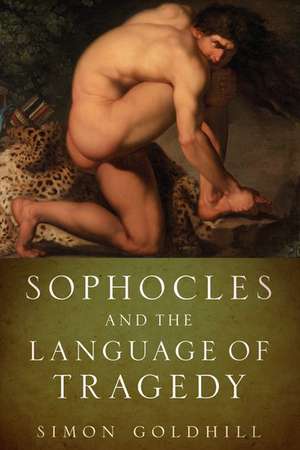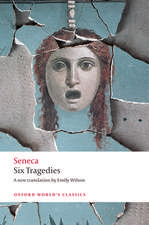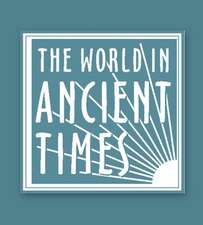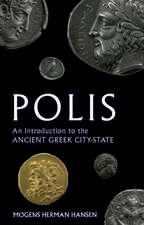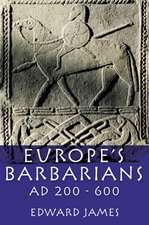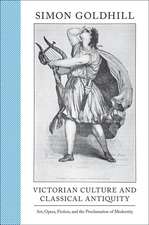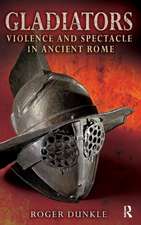Sophocles and the Language of Tragedy: Onassis Series in Hellenic Culture
Autor Simon Goldhillen Limba Engleză Paperback – 19 feb 2015
| Toate formatele și edițiile | Preț | Express |
|---|---|---|
| Paperback (1) | 244.19 lei 31-38 zile | |
| Oxford University Press – 19 feb 2015 | 244.19 lei 31-38 zile | |
| Hardback (1) | 352.55 lei 31-38 zile | |
| Oxford University Press – 5 apr 2012 | 352.55 lei 31-38 zile |
Preț: 244.19 lei
Preț vechi: 276.17 lei
-12% Nou
Puncte Express: 366
Preț estimativ în valută:
46.72€ • 48.96$ • 38.63£
46.72€ • 48.96$ • 38.63£
Carte tipărită la comandă
Livrare economică 31 martie-07 aprilie
Preluare comenzi: 021 569.72.76
Specificații
ISBN-13: 9780190226596
ISBN-10: 0190226595
Pagini: 304
Dimensiuni: 234 x 156 x 17 mm
Greutate: 0.47 kg
Editura: Oxford University Press
Colecția OUP USA
Seria Onassis Series in Hellenic Culture
Locul publicării:New York, United States
ISBN-10: 0190226595
Pagini: 304
Dimensiuni: 234 x 156 x 17 mm
Greutate: 0.47 kg
Editura: Oxford University Press
Colecția OUP USA
Seria Onassis Series in Hellenic Culture
Locul publicării:New York, United States
Recenzii
Mr. Goldhill joins the crowded field, but his work should stand out.
Goldhill's critical discussion of the historical and philosophical origin of several key concepts of Sophoclean tragedy is of great interest
A brilliant balancing act: Simon Goldhill combines close readings of Sophocles' plays with penetrating chapters on the language of tragic criticism since the nineteenth century. There is something for everyone in this exhilarating and adventurous book.
Following up on his landmark studies of Aeschylus and his influential Reading Greek Tragedy, Goldhill offers now a full-length look at Sophocles. With his customary versatility as critic and cultural historian, he offers a Janus-faced volume that looks in two directions. In the first instance, there are exemplary close readings with insistence on the rhetoric, politics, and history of 5th century Athens as essential background for articulating how the poet develops his own particular engagement with the language of tragedy. In the second, Goldhill spreads a wider net to expose the often unrecognized historicity of our own understanding of the tragic, established especially by 19th century German thinkers, for whom Sophocles represented the perfect paradigm. Like all his work, Goldhill challenges us to rethink inherited ideas and deepens our understanding at every turn of the fabled author of Oedipus the King and those who have cherished him.
With this latest book, Simon Goldhill brings his customary acumen and verve to reading the 'language' of Sophoclean tragedy from two very different perspectives. ... By placing between the same covers 'profoundly conservative' and 'rashly revolutionary' critical perspectives (3), Goldhill instills in the reader a new awareness of the interpretive practices that have sustained tragedy scholarship for centuries at the same time that he defamiliarizes them. His eye for telling detail, moreover, combined with his panoramic sweep of intellectual history, is...enthralling.
Goldhill's critical discussion of the historical and philosophical origin of several key concepts of Sophoclean tragedy is of great interest
A brilliant balancing act: Simon Goldhill combines close readings of Sophocles' plays with penetrating chapters on the language of tragic criticism since the nineteenth century. There is something for everyone in this exhilarating and adventurous book.
Following up on his landmark studies of Aeschylus and his influential Reading Greek Tragedy, Goldhill offers now a full-length look at Sophocles. With his customary versatility as critic and cultural historian, he offers a Janus-faced volume that looks in two directions. In the first instance, there are exemplary close readings with insistence on the rhetoric, politics, and history of 5th century Athens as essential background for articulating how the poet develops his own particular engagement with the language of tragedy. In the second, Goldhill spreads a wider net to expose the often unrecognized historicity of our own understanding of the tragic, established especially by 19th century German thinkers, for whom Sophocles represented the perfect paradigm. Like all his work, Goldhill challenges us to rethink inherited ideas and deepens our understanding at every turn of the fabled author of Oedipus the King and those who have cherished him.
With this latest book, Simon Goldhill brings his customary acumen and verve to reading the 'language' of Sophoclean tragedy from two very different perspectives. ... By placing between the same covers 'profoundly conservative' and 'rashly revolutionary' critical perspectives (3), Goldhill instills in the reader a new awareness of the interpretive practices that have sustained tragedy scholarship for centuries at the same time that he defamiliarizes them. His eye for telling detail, moreover, combined with his panoramic sweep of intellectual history, is...enthralling.
Notă biografică
Simon Goldhill is Professor of Greek Literature and Culture at the University of Cambridge. His previous books include Jerusalem: City of Longing, How to Stage Greek Tragedy Today, and Reading Greek Tragedy.
